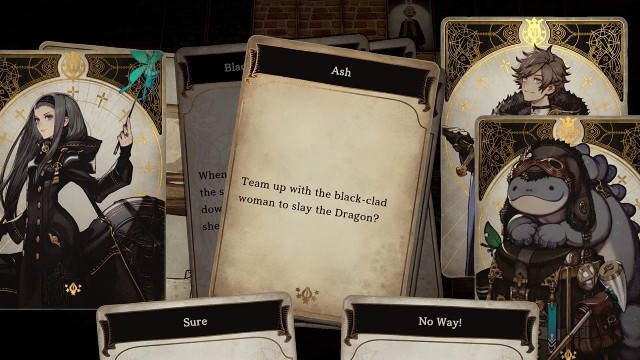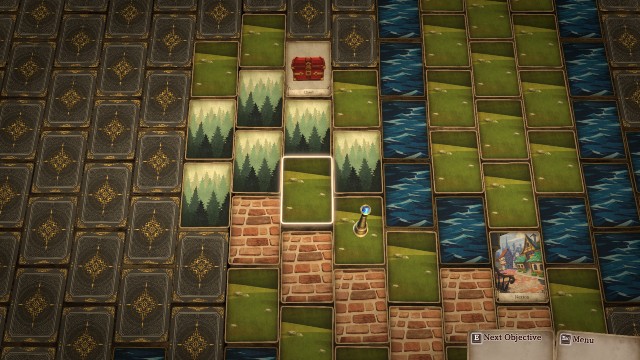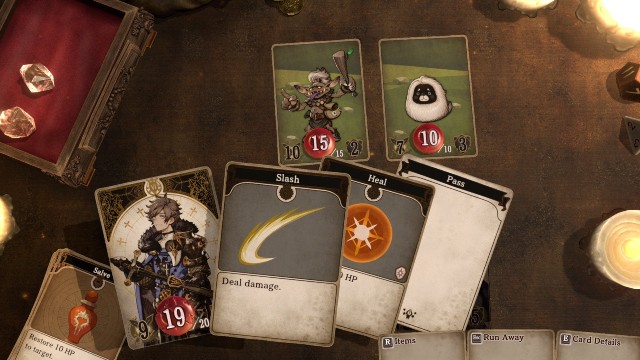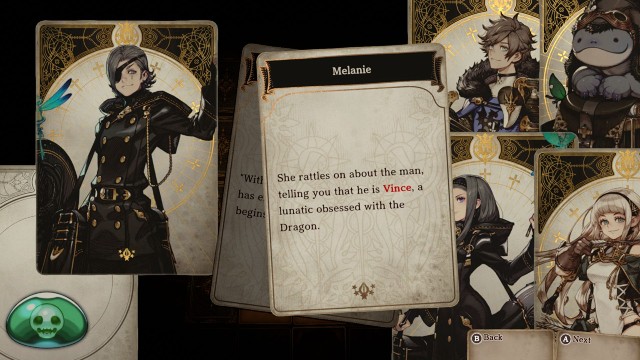You know that idea of settling in with a good book on a cold night, next to a roaring fire? Voice of Cards feels like the video game equivalent of that: a “cozy” game that I’d like to just whittle the hours away on. It’s not the most bombastic or even mechanically sound game, but there’s something undeniably quaint about Voice of Cards: The Isle Dragon Roars.
The main conceit of Voice of Cards is introduced right off the bat, the whole game plays out like a table-top RPG, narrated by the voice of Todd Haberkorn, if you choose English that is.
Every single aspect of the game is represented with a card, from the buildings and terrain to items and characters. With the chosen format, Voice of Cards puts a huge emphasis on text and music, using its presentation and the players imagination to make the story shine. Luckily, the writing is generally good enough to prop up the experience, and that trademark Yoko Taro strangeness is here in droves.
The tabletop style gives Voice of Cards an incredibly unique flair, but the one narrator being the only voice in the game never quite gelled with me. I love the style, but I consistently found myself wishing at least major characters were voiced, even though I think Todd Haberkorn does an admirable job here.

The story focuses on a young adventure, who you name, and his strange beast-like companion. After the king issues a decree to kill the dragon terrorizing the land, your merry but inexperienced duo heads out to complete the tasks, and meets a variety of other adventurers along the way.
Voice of Cards consistently has a great sense of humor and often manages to work its card aesthetic into said humor. One thing I particularly enjoyed is that your character is consistently a self-righteous doofus, in the best way possible.
As you head out on your adventure you’ll control a small board game piece that represents your party, as you jump from card to card. While exploring the world and various dungeons you’ll run up against random events, treasure, and plenty of battles.
While the card format might make Voice of Cards look like Hearthstone, the actual combat feels more similar to your typical turn-based RPG. Each party member and enemy will take a turn attacking, and everyone has their own HP pool, attack power, and defense power.

Each character has a variety of special attacks that you can use by expending crystals from your pool. Each time you take an action you’ll gain a crystal, and more powerful skills require more crystals. As your party levels up you’ll gain access to more unique, and powerful, abilities.
Combat feels pretty standard for a turn-based game, but as a whole, it never turns into something exceptional. In fact, combat is where my significant problems with the experience lie.
The random encounter rate feels a bit too high, especially when roaming through a multi-leveled dungeon. It can really slow down the experience at times, and while you get some effective fast travel options that totally cut away backtracking, I still feel like the game could have benefited from an adjustable encounter rate like in Bravely Default.

The other negative aspect in Voice of Cards is the difficulty. The game never feels like it’s posing a challenge. Basic battles are a breeze, and there’s only one or two boss battles that even feel like a real challenge. I appreciate the game being accessible in terms of difficulty, but again I think a robust difficulty slider could have worked wonders.
The good news is that everything Voice of Cards does well is generally more than enough to balance out the disappointing combat. If you have experience with Yoko Taro games you know to expect some dark twists and turns, and Voice of Cards certainly doesn’t disappoint. At the same time, however, this is a more “straightforward” experience than something like NieR: Automata, and you simply aren’t going to find the same kind of meta storytelling here.
Between the presentation, phenomenal music, and writing, I found myself inexplicably drawn to the story’s conclusion.
Voice of Cards: The Isle Dragon Roars – The Bottom Line

Pros
- Fantastic presentation that uses the card gimmick to the max
- Strong soundtrack and writing help give the game unique flair
- Consistently great sense of humor
Cons
- Easy combat system with too many random encounters
- Lack of additional voice acting feels like a hindrance
Voice of Cards is an inherently charming game that hits the ground running with its gimmick, and more often than not, puts it to good use. Despite a bit of a lackluster combat system, I think this is an experience worth seeing through to the end, especially for fans of Yoko Taro’s other work.
[Note: Square Enix provided the copy of Voice of Cards: The Isle Dragon Roars used for this review.]







Published: Nov 19, 2021 02:38 am